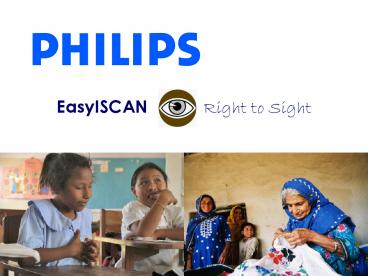EasyISCAN Right to Sight Blindness is prevalent in - PowerPoint PPT Presentation
1 / 29
Title:
EasyISCAN Right to Sight Blindness is prevalent in
Description:
EasyISCAN Right to Sight Blindness is prevalent in developing world They are treatable, though 80% of blindness can be prevented or cured Regular screening is key!! – PowerPoint PPT presentation
Number of Views:44
Avg rating:3.0/5.0
Title: EasyISCAN Right to Sight Blindness is prevalent in
1
EasyISCAN Right to Sight
2
TOC
- Overview of EasyIScan proposition
- Value Proposition House
- Selection criterion - Healthcare Incubator
3
Overview of EasyIScan proposition
4
Blindness is prevalent in developing world
45 million blind people worldwide
Nine out of ten blind people live in the
developing world
9 million blind people in India
GlaucomaDiabetic retinopathychildhood blindness
Globally, every five seconds a person goes blind
5
They are treatable, though
- 80 of blindness can be prevented or cured
- Regular screening is key!!
6
However
- Large scarcity of ophthalmologists
- 12000 practicing in India
- 800 graduate every year in India
- Most practice in cities/large towns
- Hence
- Only 7 in various stages of blindness are
screened and treated - Less than 10 of Non-Cataract diseases are
detected/treated - Less than 8 of children requiring spectacles
wear them - Less than 15 of people over 50 yrs requiring
spectacles wear them - Screening (access and cost) is the first major
bottleneck
7
If only screening can be done locally and
affordably
- Not requiring an ophthalmologist
- Simple for operators to learn and use
- Quick and easy to interpret diagnosis
- Can be deployed in rural areas
- Can operate with limited hours of grid power
- Screening for under Rs. 30 (Eu cents 70)
8
There is a large market for it
- Global visual 162 million people (2002
data) impairment (4 x blind people) - India visual 35 million peopleimpairment
9
India Business Creation Centerhas a proposition
- Fully digital intelligent
- - No hydraulics
- No chin rest
- No dedicated computing
- No special chair
- Low cost all in one
15,000
10,000
Retinal camera (Image of Retina)
Keratometer (Curvature of Cornea)
NC Tonometer (pressure in the eye)
8000
6,000
Slit Lamp Refractor(Myopia Hyperopia)
4000
?
3,000
Slit Lamp (image of cornea)
Head Mount Display with Camera Constant
pressure Air Jet unit PC interface Hospital go
to patient
10
With a family of products
Stand alone portable Intelligent Imaging With
pressure meter
Low cost Image enhancer For low vision patients
3500
1200
Intelligent Imaging With pressure meter
Personal Intelligent Imaging With pressure meter
Intelligent Imaging
2500
3000
2000
X 10,000
X 5,000
X 7,500
2007
2009
2008
11
And others in the value chain are willing to
partner
- Aravind Eye Hospital
- Indias leading Eye Care Institution
- 30 Years of Existence
- 16 M Out Patients, 2.4 M eye Surgeries till date
- More Surgeries per year than whole of UK, 11 of
US - Plan 100 hospitals in the next 5 years
- Manufactures and sells to over 120 countries with
7 Market share worldwide. - Pharmaceuticals companies
- Initial discussions with Eye drop manufacturers
12
Estimated Market Potential over 5 year period
- Institutional buyers 2000 units
- Government Bodies 20000 units
- Opticians 12000 units
- Total Market Potential of 34000 units
- Total sale value of 100 Million Euros
13
Philips has strengths to succeed
- Optical technology
- Image acquisition
- Image processing
- Decision support systems
- Synergies with Diabetes monitoring project in
Philips Research
14
If only
- Philips Medical Systems includes ophthalmology in
its market scope - IBCC is funded for developing this proposition
- Need 300 kEuros in 2006 2007
- First demonstrator in April 2006
- Trials start at Aravind mid 2006 (committed)
- Screening software development for Complex
diagnostics - Excludes cost of other organizations (Philips
Research for example) - Includes the cost 15 units needed in field trials
15
A first prototype is being developed at PIC
Bangalore
- Focus on 83 opportunity
- Cataract, Refractive errors
- Platform from Maastricht Instruments, Maastricht
Univ - Resources from CE, AppTech
16
If action is not taken to reduce blindness, the
number of blind people in the world is estimated
to increase from 45 million in 2000 to 76 million
by 2020, creating an enormous economic burden.
Developing countries could potentially achieve a
192 billion boost in economic productivity over
the next 20 years if they adopt appropriate
measures to reduce blindness.
17
People do not go blind by the million, they go
blind one by oneand for each person the impact
is enormous. Poverty and blindness are a
formidable combination, depriving many people in
the developing world of basic human rights. Loss
of sight often results in social exclusion,
making blind people vulnerable to abuse, poverty
and early death. Less than half of all children
who lose their sight will survive to adulthood.
The figures appear overwhelming, yet providing
help is simple. Lets make a start.
18
Value Proposition House
19
EasyIScan version 1.0
36
20
Selection criterion Healthcare Incubator
21
Market Attractivenessqualitative profile
6
22
Strategic Fitqualitative profile
7
23
Commercial chance of success qualitative profile
8
24
Technical chance of successqualitative profile
9
25
Auxillary slides
26
(No Transcript)
27
Global visual impairment
28
Causes of blindness as a percentage total
blindness
29
Global patterns of visual impairment































